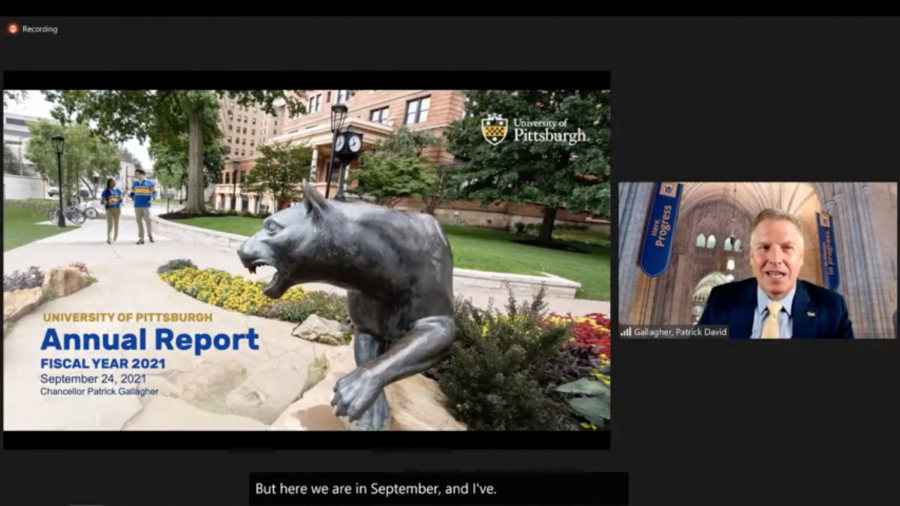Gallagher delivers annual report to Board of Trustees amid ongoing pandemic
Chancellor Patrick Gallagher speaking at Friday morning’s Board of Trustees meeting.
September 24, 2021
Even as many are concerned about a possible flu and COVID-19 “twindemic,” Chancellor Patrick Gallagher said Friday that one of safest places in western Pennsylvania might be a Pitt campus.
“In all cases, our vaccination rates greatly exceed the vaccination rates in our surrounding counties,” Gallagher said.
Gallagher discussed the latest on Pitt’s COVID-19 response and student enrollment, among other topics, at Friday morning’s Board of Trustees meeting ahead of Homecoming weekend. Valerie Njie, president of the Pitt Alumni Association, also provided an update about the PAA’s last year at the meeting.
Gallagher said Pitt is “not neutral” on the importance of students, faculty and staff getting the COVID-19 vaccine.
“We think vaccination and mitigation, distancing and hygiene and social distance are still key cornerstones of a successful strategy to keep our community safe and have a great academic year at the fullest extent possible.” Gallagher said.
Gallagher said Pitt’s vaccination center at the base of Nordenberg Hall is administering all three FDA-approved COVID-19 vaccines — Pfizer, Moderna and Johnson & Johnson — and has administered over 20,000 COVID-19 vaccines in 2021 so far. He said the center is now also offering flu shots as flu season approaches.
Gallagher noted that vaccination rates at the Oakland campus are all approaching or above 90%. According to a Thursday report from the COVID-19 Medical Response Office, 94% of undergraduate students have uploaded proof of vaccination against COVID-19. The office also said 95% of graduate students, 91% of faculty and 89% of staff uploaded proof of vaccination.
While Pitt’s current COVID-19 health guidelines do not include a vaccine mandate, all students, faculty and staff on all campuses, regardless of vaccination status, must wear masks indoors, unless in “your enclosed private office or dwelling.” Individuals who are not fully vaccinated or live with someone who is immunocompromised, must wear masks both indoors and outdoors, if unable to social distance. Community members who do not provide proof of vaccination are required to participate in weekly COVID-19 testing.
Gallagher said Pitt’s vaccination rates contribute to Allegheny County having much higher vaccination rates than surrounding counties in western Pennsylvania. He commended the Pitt community for doing its part to keep the University safe by getting vaccinated.
“We understand it’s been turbulent, but I’m really delighted with the degree to which our community is, you know, living up to their responsibility to make sure we all do our part to make sure Pitt is a safe place and a place where can enjoy that great Pitt education in our classrooms, in our research labs.” Gallagher said. “And so we’re pleased by that.”
Gallagher said that in comparison to last year, case rates have been “quite modest” on campus, adding that there is “essentially a very steady and fairly low rate of infection.”
“If you recall last year what would happen is following an event like student arrival, we’d see an outbreak and then it would go up, moderate, we’d have to do very strong mitigation to bring it down,” Gallagher said. “None of the rapid increases, outbreak-like behavior that we saw last year. And again, that’s a combination of the immunity from vaccines and natural immunity in our population, coupled with the fact that inside our buildings we still have universal masking.”
Gallagher also talked about enrollment rates this year. He said while the University feared the COVID-19 pandemic would wreak havoc on student enrollment, undergraduate and graduate enrollment went up in all areas except doctoral programs and undergraduate enrollment at some regional campuses.
“It turns out, while students’ lives were certainly upended, and how you applied and how you were admitted to college changed, the overall trend patterns for the University of Pittsburgh have been quite stable,” Gallagher said.
Gallagher added that Pitt’s undergraduate first-year class was “historic” this year. He said not only is this the largest first-year class at Pitt ever, but there are other “dramatic” increases in trends for this class, like more Pennsylvania and Pell Grant recipient students.
The chancellor also briefly talked about the University’s financial situation. He noted that Pitt applied two cuts in last year’s budget, including cost-saving measures such as freezing faculty and staff salaries, but this year’s outlook is looking rosier. He said Pitt is beginning its recovery from the pandemic in a “relatively good position.”
“We did not have to reduce or cut program staff, no furloughs, no layoffs even though we were strongly affected in the last year. That was commendable, but it wasn’t without pain,” Gallagher said. “We’re recovering this year, I wouldn’t say this is a normal year.”
Gallagher thanked Pitt community members for all they are doing during this tumultuous time.
“Everyone is doing their part even though it’s not easy and, by and large, the activities on campus have resumed in a way much closer to what we expected and much different from last year when they were severely affected,” Gallagher said. “We continue to be optimistic but one thing to keep in mind is that the virus is not going away. We’re going to be co-existing with this in the long run.”








